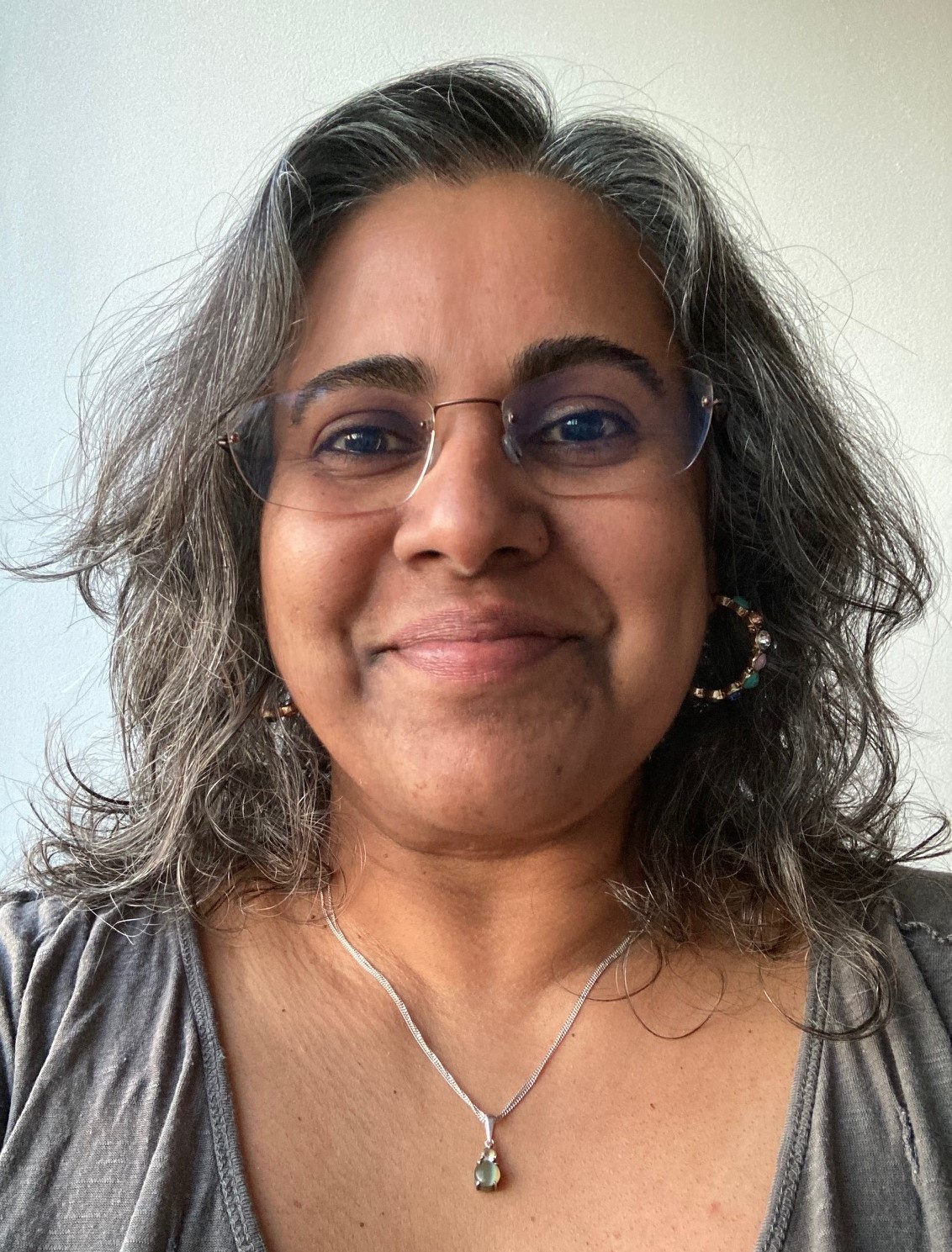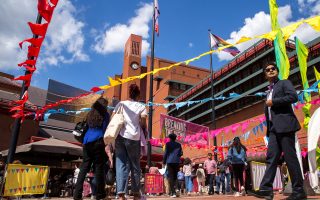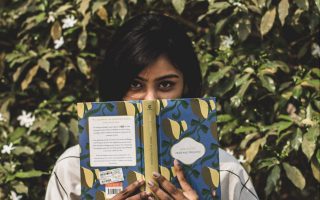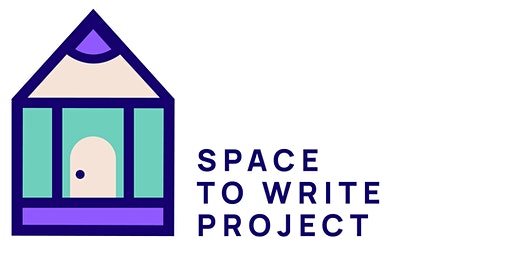
Q. Let’s start with your Discoveries win. Tell me more about your writing journey up until that point and what shifted for you when you found out you’d won?
It’s been a long old journey and when I reflect on the twists and turns it has taken, I am both humbled and hugely grateful to everyone who has helped me keep going.
By the time I entered the Discoveries prize, I had been writing for the best part of thirty years. I studied Drama at university. At that point, I had my heart set on becoming a playwright. Things didn’t work out quite as I had hoped, but I continued to write. I experimented with short stories, screenplays, poetry and novels. Over the years, I attended number of short, creative writing courses, all of which were very helpful.
However, my time spent with Commonword, an organization in Manchester that supports writers from under-represented groups, probably had the greatest impact in developing my skills and voice as a writer. I attended Commonword’s weekly writing workshop, where I was in a crit group with writers like Christina Fonthes, Afshan D’souza-Lodhi, Hafsah Aneela Bashir, Mahboobeh Rajabi and Charlotte Maxwell. I was mentored by the extraordinary Martin De Mello who was so encouraging and put a lot of time and effort into helping me become a better writer, as did the incomparable Jennifer Makumbi — her enthusiasm for my work gave me confidence and was hugely motivating. It was also the first time I’d been in an environment which unapologetically centred the work of writers of colour. Having been the only brown person in my year studying drama at university (almost 20 years prior), I cannot overstate how important this was for me. I also met Rebecca Zahabi, who is now a close friend, a trusted beta reader, and a very important person in my writing life, thanks to Commonword.
That said, when I entered Discoveries, at the age of 49, the publishing industry felt like something that was always going to be out of reach, and I had made peace with the idea that I would never be traditionally published. And to be honest, no longer chasing that dream, was a huge relief. I finally had a job that I really enjoyed and found fulfilling. I was in a great writing group. And I was having a lot of fun just writing for myself, and to entertain my peers. I wrote my entry for the Discoveries Prize, Thursday, purely as a writing exercise. I sent it off and did not give it a second thought. So, when I was longlisted, and then won the prize, it was absolutely mind blowing. Everything was turned on its head — in the best possible way.
It’s been over a year now and I have to say the novelty hasn’t worn off. I’m still getting used to having an agent (the fabulous Jess Molloy at Curtis Brown) and feeling like I’ve turned pro. Also, one of the most important aspects of the Discoveries experience is the supportive community that our cohort of longlistees are building. It’s been such a joy to be part of that process and to get to know these absolutely amazing women. We are learning so much from each other, and I am staggered by the talent and wealth of experience in the group.
Q. What’s your writing life looked like since then and how have you navigated the limelight of being a winner of a major prize?
On a practical level, I went down to four days a week at work to give myself more time to write. Having the Audible commission to complete in the first year was great because it meant I was forced to get down to business straight off the bat: I had to establish a sustainable writing routine and be disciplined in order to deliver drafts on time. Having to be accountable in that way has made me a lot more productive.
Also, having representation is a complete game changer. It opens doors to the publishing industry and gives you sense of being part of a much larger creative community. When I think of Jess, my agent, I have the sense that we are on a great, big, adventure together. It’s a lovely feeling. We’ve only just started working with each other, but I am curious and excited to see how our working relationship develops. I want to bring the best of myself as a writer, and a person, to that relationship so that we can both grow and develop in a way that is mutually fulfilling and fun. And expansive.
I don’t really think about winning the prize in terms of being thrust into the limelight. After the initial flurry of excitement, which was a lot of fun and a tad overwhelming, everything has calmed down and life goes on. And writing is mostly about sitting at my desk on my own or pottering about. However, I do think about it in terms of the responsibility I have for the privilege it has afforded me. And that doesn’t feel like a burden. It feels like a huge opportunity to learn and grow and connect more meaningfully with other writers and readers. It feels like something that has come into my life to help me become more open-hearted, and more present.
Q. You recently had your commissioned novella, The Mother Son published on Audible. Please tell us more.
I can’t tell you how exciting it is to have something I have written available for people to listen to on Audible. I mean, it’s just wonderful!
The commission was part of the prize. I had to pitch an idea (any topic, any genre) via my agent, which Audible approved. After that it was all systems go! I haven’t written anything so quickly, beginning to end, ever. It was intense and challenging and hugely exciting. I absolutely loved it and learnt so much.
I hadn’t listened to many audiobooks before being commissioned so that’s the first thing I did: I listened to as much as I could and I really took notice of what I enjoyed as a listener: economical description, distinct voices in dialogue, clarity and pace.
Most people I talked to said that they listened to Audiobooks whilst doing something else — driving, cooking, walking the dog, running, doing housework. And because of that the text is always competing for the listeners’ attention and focus; they may miss something and not rewind and play back, in the way they would turn back a page if they had a book in their hands. It made me consider chapter lengths and made me very conscious of wanting transitions to be strong and clear.
Nicola Clayton, who directed The Mother Sun (and who was so, so, lovely) talked about audio narration as being like ‘whispering in the listeners’ ear.’ I loved that note. And I’ve come to think of it as a particularly intimate form of storytelling, one that speaks to our memories of being read to as children, as well as the connection we feel with the voice of a loved one at the other end of a phone call.
Whilst I tried to bear all of this in mind when I was writing and editing, inevitably I learnt more about what I should and should not do after the fact — once I’d heard and understood more deeply about how words translate in the recording. For example, I enjoy describing the quality of character’s voice as part of their physical description. This, of course, is unhelpful commentary when their words are being voiced by an actor, who is interpreting the quality of the character’s voice. The other issue I struggled was with speech tags. Having seen how the actor, Nimmi Harasgama, was able to so beautifully distinguish voices, I wish I had taken some of the speech tags out. They felt a bit clumsy. Also, there was a whole thread about a character not being able to pronounce another character’s name, which only works if you see it written down! It’s a rookie error I will not repeat!
Also, I was conscious of wanting to approach writing for Audio as a dramatist rather than as a novelist, even though I was writing prose. I included far more ‘speeches’ than I think I would have if I was telling this story more novelistically. One of the things I enjoyed most was writing the conversations between Surya and Rafe. And I am particularly fond of Mrs Bandara’s what-happened-on-the-bus speech. I secretly hope, one day, Sri Lankan actors will use that as an audition piece.
Q. And if it’s not rude to ask, where are you with your novel, Thursday?
I am working on it, still figuring it out. There are days when it flows beautifully and others when I despair… the usual ups and downs!
Q. What inspires you as a writer and brings you back to the page?
Writing (and reading) is a way of life. Or, rather, it is my life. Because I rely on it so heavily to exist in the world, it’s something that’s always with me, even if I am not on the page. Okay, so saying that aloud, it feels totally cringe, but I promised myself I would be as honest as I can when answering these questions. . . so apologies to anyone who is cringing right now.
Q. As it’s South Asian Heritage Month. I wondered if you might share with us your favourite books or authors from South Asia?
Home Fire by Kamila Shamsie. I think it has the best ending of any book I have ever read. Every story strand is propelled forward with such control and deliberation, and in such deep conversation with the book’s ancestor (it is a retelling of Antigone), that the ending lands with such incredible force. Encountering the last few lines was like being shot. Everything went dark. It was a physical and psychological experience. I will never forget that feeling. That a writer can make words on a page do that, to me, feels miraculous; magical, or alchemical — in the spiritual sense of that word.
Marriage of a Thousand Lies by SJ Sindu. This queer love story is so raw and utterly compelling. The writer is unflinching in getting to the heart of what the protagonist, Lucky, is going through. It is complex and messy, and unsentimental. I think it is a profoundly brave book. It is talking about things that are still, I believe, very hard to discuss openly, if you are a South Asian woman. I am very grateful, both as a queer reader and writer, that this book exists.
I also want to give a shout out to The Funny Boy by Shyam Selvadurai. I devoured this book when it first came out. I lived for several years in Colombo (years when the book is set) and it was the first time in my life that I had read anything that was set both in a time and place, and cultural context, that was part of my lived experience. It has a very special place in my heart.
Q. What advice would you give to someone who has been writing for a long time but hasn’t seen a breakthrough?
I am really torn about answering this question, and I have agonised over it for quite some time. On the one hand my instinct is to say, don’t listen to anyone’s advice. No two people have the same writing journey. And what each of us means by a breakthrough will vary widely. If we are talking in terms of publishing, there are no guarantees, no matter how good you are, no matter what you do, or even who you know. And, even if you are published, that does not mean you will continue to be published, or be successful, or be able to earn a living by it. The goal posts shift at each turn. So much of it is dumb luck, or in the hands of economic, historic, and geo-political structures we have little to no control over, or part of some divine mystery, or possibly a combination of all three – depending on where you stand. If you’ve been writing for a while, hopefully, you already know why you write. Trust in what you need to learn/explore/understand/know/experience. Trust in what you need to say. And why you need to say it. Keep your own counsel. You already know best what you need to do, or not do.
On the other hand, I feel compelled to say something that might be of comfort to someone who is having a bad writing day and is feeling a bit shit! And to that end, all I can really do is share something of my experience, and hope that it will be of use. So here goes:
I wanted to give up writing many times. And I did give up, more than once, because chasing the dream of being a famous author (which is how I saw it in my teens and 20s) was hard, and exhausting and lonely. It cost me careers and relationships. At times, it took a toll on my mental health. It certainly has negatively impacted my finances. It has, I believe, looked to people that I care about — family, friends, community — like I am being selfish, lazy, irresponsible, indulgent, wasteful, foolish, vain, grandiose, delusional. Even if these judgements are not verbalised, by failing to meet societal or cultural expectations, by failing to fulfil my part in so many unspoken social contracts, they have (for me at least) felt palpable. And it was hard to live with.
Approaching my 50s, it did feel humiliating to have nothing materially to show for almost thirty years of striving. But no matter how many times I tried to stop, I always ended up coming back to writing because it seems to be something I can’t live without. It’s the thing that brings me the greatest joy, the greatest sense of fulfilment and greatest connection with myself and others. I love talking about writing, thinking about writing. I love being around other writers. And I want to learn how to be a better writer. I want to understand more deeply its power to shape our lives, our cultures; and the possibilities that affords us. I want to learn how to dance with my writing ancestors, who, I believe, transcend the boundaries imposed on us by conventional wisdom.
It took me a long time to separate what it could mean for me to be a fulfilled writer, with what it means to want to be a successful, published author. Obviously, whilst not mutually exclusive, they are not necessarily the same thing. I felt writing, I could get on with. I had to accept that the other thing was out of my control.
But I am so glad that I kept at it. I am delighted beyond measure that I have an agent now, that I am part of the Discoveries community, that I have an audiobook out; and that people I don’t know, will never know, have listened to it, and enjoyed it. It feels glorious. All this, undoubtedly, brings greater opportunities and has, already, broadened my horizons.
However, I am also eternally grateful that the Discoveries Prize happened to me at this stage in my life, and after I had completely let go of any attachment to being published or seeking validation of my worth as a writer from the publishing industry. It has given me the freedom to enjoy this moment unconditionally for the great gift that it is, without fear of what may or may not happen next; and what that might mean.
So, if you’ve been at it for years and years and you are reading this on a bad day, and you are feeling like it’s not worth the effort, I just want to say, your story matters. How well you tell it matters.
So, take a break. Have a cup of tea. Forget all about agents and publishers and everyone on twitter. Forget about your family, and friends, and everyone you went to school with. Forget about them all!
Then go back to your desk and get in touch the beating heart of your story. Bring all the love and attention and care in the universe to it. Bring all your courage to it. Bring your truth to it. Write like your hands are on fire and your heart is made of light.
When you are done, invite the universe to have a read. Then, listen very carefully.
And trust that you will know what needs to happen next.
Sui Annukka is a British author of Sri Lankan heritage. She won the 2022 Women’s Prize Discoveries competition and was shortlisted for the 2022 PFD Queer Fiction Prize. She is the author of the audiobook The Mother Sun. Sui has had poetry and short fiction published in the following anthologies: Filigree – contemporary Black British Poetry (Peepal Tree, 2018), Shots in the Dark (Crocus Books, 2018), Sounds Exceeding 80 Decibels (Crocus Books, 2017) and Elevator Fiction (Crocus Books, 2016). She was a participant in Manchester Commonword’s Women in the Spotlight programme, BBC Northern Voices, and Eclipse Theatre’s SLATE Supported Artists scheme. Sui read Drama at the University of Bristol. She later studied Production Design at the National Film and Television School and has enjoyed a varied career in film art direction. Sui currently lives in London where she writes and works part-time as a High School Teaching Assistant.
The Mother Son is available on Audible.


